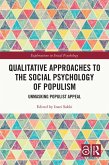Now in its third edition, this successful book introduces students to the area of social science theory and research known as social constructionism. Using a variety of examples from everyday experience and from existing research in areas such as personality, sexuality and health, it clearly explains the basic theoretical assumptions of social constructionism. Key debates, such as the nature and status of knowledge, truth, reality and the self are given in-depth analysis in an accessible style. Drawing on a range of empirical studies, the book clearly defines the various different approaches to social constructionist research and explores the theoretical and practical issues involved. While the text is broadly sympathetic to social constructionism, it also adopts a critical perspective to the material, addressing its weaknesses and, in the final chapter, subjecting the theory itself to a more extensive critique. New to this edition: Extended coverage of the relationship between 'mainstream' psychology and social constructionism and how the two fields can engage with each other. An exploration of the rise and popularity of neuroscience and the challenge it poses to social constructionism. New material on the field of psychosocial studies. Updated coverage of existing key issues such as age and sexuality, and inclusion of more recently emerging issues (e.g. status and role of affect). Updated discussion of key social constructionist contributors, with revised references. Updated chapter on research methods, including more on narrative and critical narrative analysis, and personal construct methods. The third edition of Social Constructionism extends and updates the material covered in previous editions and will be an invaluable and informative resource for undergraduate and postgraduate students across the social and behavioural sciences.
Hinweis: Dieser Artikel kann nur an eine deutsche Lieferadresse ausgeliefert werden.
Hinweis: Dieser Artikel kann nur an eine deutsche Lieferadresse ausgeliefert werden.
'Vivien Burr's Social Constructionism is one of the most accessible texts on this complex philosophical approach to social science. In this fourth edition, she has provided some critical updates which illustrate the breadth and reach of social constructionist thinking, incorporating, for example, the recent emergence of new materialism which examines how objects in the world, from rocks to PowerPoint presentations, acquire their meaning and status as definite "things" which exist independently of human beings. Using easy to understand examples and illustrations to bring social constructionist ideas and thinking to life, this book is a must read for any beginner on the subject as well as for those already familiar with it. Its lively and engaging writing makes this text a hugely enjoyable as well as an informative and thought provoking read.'
- Penny Dick, Sheffield University Management School
'Reading this book is an absolute feast: Not only did Prof. Vivien Burr write a masterpiece and game- changer for the ways in which science and knowledge are understood and practiced in the social sciences, but in this revised edition she even makes social constructionist theories more practical and useful through numerous examples and specific applications. Her blending of theory, innovation, and practice is masterful and insightful, while being clear and applicable. This book does more than 'cover the territory' of social constructivism: it brings it to life through its theoretical varieties in the field of psychotherapy, education, consultation, and research. It is impossible to read this book without feeling that it has somehow provoked and inspired our ways of doing research or being a practitioner!'
- Prof. Marco Gemignani, Department of Psychology, Universidad Loyola Andalucía, Spain, and President- elect of the Association of European Qualitative Research in Psychology
- Penny Dick, Sheffield University Management School
'Reading this book is an absolute feast: Not only did Prof. Vivien Burr write a masterpiece and game- changer for the ways in which science and knowledge are understood and practiced in the social sciences, but in this revised edition she even makes social constructionist theories more practical and useful through numerous examples and specific applications. Her blending of theory, innovation, and practice is masterful and insightful, while being clear and applicable. This book does more than 'cover the territory' of social constructivism: it brings it to life through its theoretical varieties in the field of psychotherapy, education, consultation, and research. It is impossible to read this book without feeling that it has somehow provoked and inspired our ways of doing research or being a practitioner!'
- Prof. Marco Gemignani, Department of Psychology, Universidad Loyola Andalucía, Spain, and President- elect of the Association of European Qualitative Research in Psychology
"Social Constructionism is a great book, and has been on my recommended reading lists for a long time. It's been an obvious hit with students as my copy has gone missing."
- Andy Lock, School of Psychology, Massey University, New Zealand
"This book is an excellent introduction to social constructionism, an important critical position in psychology. Its many strengths include its impressive clarity and concision, which make the book accessible to undergraduates, and its accuracy and sophistication in its accounts of complex theoretical positions, meaning that the readership can extend (and has extended) to postgraduate students and to academics moving into this area of work."
- Stephen Frosh, Department of Psychosocial Studies, Birkbeck, University of London, UK
- Andy Lock, School of Psychology, Massey University, New Zealand
"This book is an excellent introduction to social constructionism, an important critical position in psychology. Its many strengths include its impressive clarity and concision, which make the book accessible to undergraduates, and its accuracy and sophistication in its accounts of complex theoretical positions, meaning that the readership can extend (and has extended) to postgraduate students and to academics moving into this area of work."
- Stephen Frosh, Department of Psychosocial Studies, Birkbeck, University of London, UK








